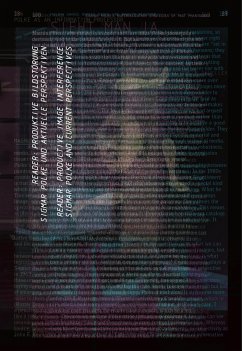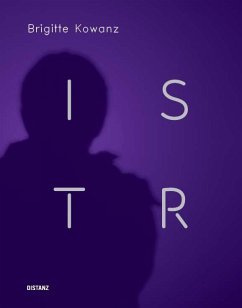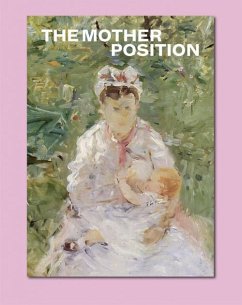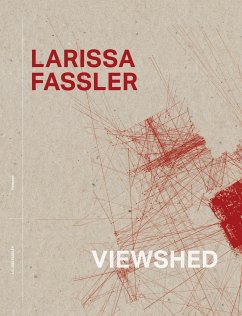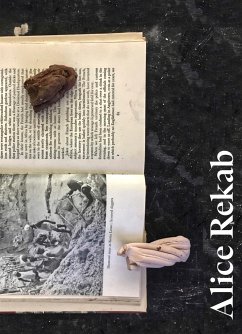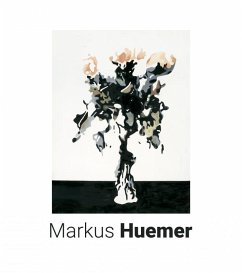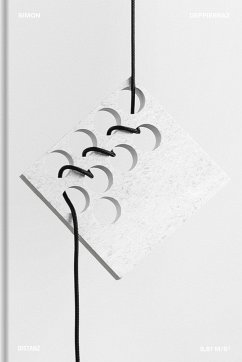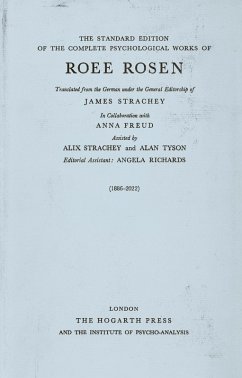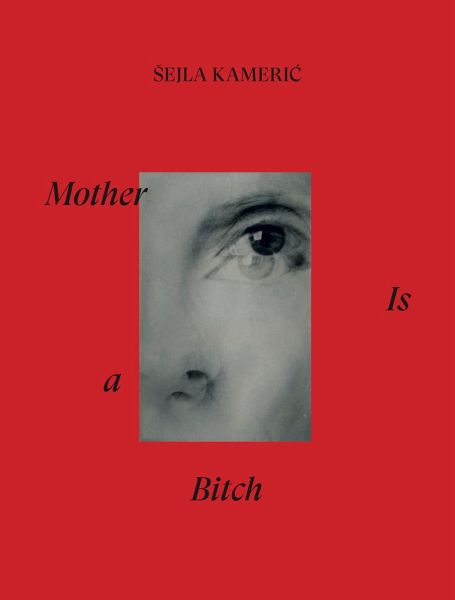
Mother is a bitch
¿ejla Kameri¿
Herausgegeben: Kleindienst, Ziva
Versandkostenfrei!
Sofort lieferbar
38,00 €
inkl. MwSt.

PAYBACK Punkte
0 °P sammeln!
Uber das Selbst, die Erinnerung und ... das LachenIn den letzten 25 Jahren hat Seijla Kameric (geb. 1976 in Sarajewo, lebt und arbeitet in ebenda und Berlin) eine bemerkenswerte Anzahl von Kunstwerken geschaffen, die auf Gesten der Selbstdarstellung basieren. Sie bezeugen Kamerics bestandige Treue zum Sujet des Selbstportrats und ihr unkonventionelles Verstandnis dieser selbstreferenziellen Praxis.Mother is a bitch versammelt Texte und Bilder, die die vielfaltige Praxis der Künstlerin reflektieren und zwei Hauptlinien ihres Werks verfolgen: Selbstportrats und Textilarbeiten. Diese Werke basie...
Uber das Selbst, die Erinnerung und ... das Lachen
In den letzten 25 Jahren hat Seijla Kameric (geb. 1976 in Sarajewo, lebt und arbeitet in ebenda und Berlin) eine bemerkenswerte Anzahl von Kunstwerken geschaffen, die auf Gesten der Selbstdarstellung basieren. Sie bezeugen Kamerics bestandige Treue zum Sujet des Selbstportrats und ihr unkonventionelles Verstandnis dieser selbstreferenziellen Praxis.
Mother is a bitch versammelt Texte und Bilder, die die vielfaltige Praxis der Künstlerin reflektieren und zwei Hauptlinien ihres Werks verfolgen: Selbstportrats und Textilarbeiten. Diese Werke basieren auf Kamerics eigenen Erfahrungen, Erinnerungen und Traumen und führen uns in globale Raume der Vertreibung und Diskriminierung. Sie werden durch die Perspektive von Geschlecht, Arbeit, Migration, Klasse und Fürsorge betrachtet und spielen mit Vergangenheit und Gegenwart.
Inspiriert von He le ne Cixous' e criture feminine, des "weiblichen Schreibens", die als Stromung der feministischen Philosophie Elemente der Psychoanalyse, der Literaturtheorie und des Dekonstruktivismus verbindet, betrachten die Autor_innen der Publikation Schreibhandlungen als Subversion patriarchaler Ordnungen. Durch die Konfrontation der in Auftrag gegebenen Texte mit Reproduktionen von Kamerics Werk werden Themen wie Hexerei, Feminismus, Selbstreflexion, Selbsterforschung und Selbstausbeutung verhandelt. Mit Beitragen von Hana Curak, Iskra Geshoska, Jana Kocevska, Edi Muka, Natalija Paunic, Linda Peitz, Bojana Pejic, Nicola Petek, Magdalena Radomska, Milica Radulovic, Mathilde Sandlarz, Milica Trakilovic, Adriana Tranca und Jasmina Tumbas, zusammengestellt von Ziva Kleindienst.
On Selfhood, Memory, and ... Laughter
Over the past 25 years, Seijla Kameric (b. Sarajevo 1976; lives and works in Sarajevo, Berlin, and Istria) has produced a remarkable number of art works based on the self-presentational gestures. They reveal Kameric's enduring allegiance to the subject of self-portraiture and her unconventional comprehension of this self-referential practice.
Mother is a bitch brings together texts and images that reflect on Kameric's multifaceted practice following two main lines within her body of work: self-portraits and textile works. These artworks are based on Kameric's own experiences, memories and dreams and take us to global spaces of displacement and discrimination. They are viewed through the lenses of gender, labor, migration, class, and care, imbued with interweaving temporalities-past and present.
Inspired by He le ne Cixous' e criture feminine or "women's writing"-a theory of feminist philosophy that combines elements of psychoanalysis, literary theory, and deconstructivism, the authors of the publication consider acts of writing as a subversion of patriarchal orders. The commissioned texts are juxtaposed with one another and with reproductions of Kameric's works, negotiating themes such as witchcraft, feminism, self-reflection, self-exploration, and self-exploitation. With contributions by Hana Curak, Iskra Geshoska, Jana Kocevska, Edi Muka, Natalija Paunic, Linda Peitz, Bojana Pejic, Nicola Petek, Magdalena Radomska, Milica Radulovic, Mathilde Sandlarz, Milica Trakilovic, Adriana Tranca and Jasmina Tumbas, edited by Ziva Kleindienst.
In den letzten 25 Jahren hat Seijla Kameric (geb. 1976 in Sarajewo, lebt und arbeitet in ebenda und Berlin) eine bemerkenswerte Anzahl von Kunstwerken geschaffen, die auf Gesten der Selbstdarstellung basieren. Sie bezeugen Kamerics bestandige Treue zum Sujet des Selbstportrats und ihr unkonventionelles Verstandnis dieser selbstreferenziellen Praxis.
Mother is a bitch versammelt Texte und Bilder, die die vielfaltige Praxis der Künstlerin reflektieren und zwei Hauptlinien ihres Werks verfolgen: Selbstportrats und Textilarbeiten. Diese Werke basieren auf Kamerics eigenen Erfahrungen, Erinnerungen und Traumen und führen uns in globale Raume der Vertreibung und Diskriminierung. Sie werden durch die Perspektive von Geschlecht, Arbeit, Migration, Klasse und Fürsorge betrachtet und spielen mit Vergangenheit und Gegenwart.
Inspiriert von He le ne Cixous' e criture feminine, des "weiblichen Schreibens", die als Stromung der feministischen Philosophie Elemente der Psychoanalyse, der Literaturtheorie und des Dekonstruktivismus verbindet, betrachten die Autor_innen der Publikation Schreibhandlungen als Subversion patriarchaler Ordnungen. Durch die Konfrontation der in Auftrag gegebenen Texte mit Reproduktionen von Kamerics Werk werden Themen wie Hexerei, Feminismus, Selbstreflexion, Selbsterforschung und Selbstausbeutung verhandelt. Mit Beitragen von Hana Curak, Iskra Geshoska, Jana Kocevska, Edi Muka, Natalija Paunic, Linda Peitz, Bojana Pejic, Nicola Petek, Magdalena Radomska, Milica Radulovic, Mathilde Sandlarz, Milica Trakilovic, Adriana Tranca und Jasmina Tumbas, zusammengestellt von Ziva Kleindienst.
On Selfhood, Memory, and ... Laughter
Over the past 25 years, Seijla Kameric (b. Sarajevo 1976; lives and works in Sarajevo, Berlin, and Istria) has produced a remarkable number of art works based on the self-presentational gestures. They reveal Kameric's enduring allegiance to the subject of self-portraiture and her unconventional comprehension of this self-referential practice.
Mother is a bitch brings together texts and images that reflect on Kameric's multifaceted practice following two main lines within her body of work: self-portraits and textile works. These artworks are based on Kameric's own experiences, memories and dreams and take us to global spaces of displacement and discrimination. They are viewed through the lenses of gender, labor, migration, class, and care, imbued with interweaving temporalities-past and present.
Inspired by He le ne Cixous' e criture feminine or "women's writing"-a theory of feminist philosophy that combines elements of psychoanalysis, literary theory, and deconstructivism, the authors of the publication consider acts of writing as a subversion of patriarchal orders. The commissioned texts are juxtaposed with one another and with reproductions of Kameric's works, negotiating themes such as witchcraft, feminism, self-reflection, self-exploration, and self-exploitation. With contributions by Hana Curak, Iskra Geshoska, Jana Kocevska, Edi Muka, Natalija Paunic, Linda Peitz, Bojana Pejic, Nicola Petek, Magdalena Radomska, Milica Radulovic, Mathilde Sandlarz, Milica Trakilovic, Adriana Tranca and Jasmina Tumbas, edited by Ziva Kleindienst.











